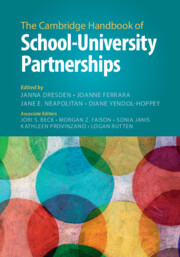Refine search
Actions for selected content:
11 results

The Cambridge Handbook of School–University Partnerships
-
- Published online:
- 05 November 2025
- Print publication:
- 07 August 2025
25 - Teacher Leaders in School–University Partnerships
- from Part IV - Leadership in School–University Partnerships
-
-
- Book:
- The Cambridge Handbook of School–University Partnerships
- Published online:
- 05 November 2025
- Print publication:
- 07 August 2025, pp 375-398
-
- Chapter
- Export citation
43 - What’s Needed Now
- from Part VI - Inquiry and Innovation in School–University Partnerships
-
-
- Book:
- The Cambridge Handbook of School–University Partnerships
- Published online:
- 05 November 2025
- Print publication:
- 07 August 2025, pp 696-721
-
- Chapter
- Export citation
18 - Examining the Link Between School–University Partnerships and Student Learning Outcomes
- from Part III - Equity and Student Learning in School–University Partnerships
-
-
- Book:
- The Cambridge Handbook of School–University Partnerships
- Published online:
- 05 November 2025
- Print publication:
- 07 August 2025, pp 287-307
-
- Chapter
- Export citation
3 - More Commonalities Than Differences
- from Part I - The History and Conceptual Foundations of School–University Partnerships
-
-
- Book:
- The Cambridge Handbook of School–University Partnerships
- Published online:
- 05 November 2025
- Print publication:
- 07 August 2025, pp 42-64
-
- Chapter
- Export citation
46 - School–University Partnerships for Teacher Preparation
- from Part VII - Funding, Policy, and the Politics of School–University Partnerships
-
-
- Book:
- The Cambridge Handbook of School–University Partnerships
- Published online:
- 05 November 2025
- Print publication:
- 07 August 2025, pp 746-765
-
- Chapter
- Export citation
39 - Teacher Inquiry in Professional Development Schools
- from Part VI - Inquiry and Innovation in School–University Partnerships
-
-
- Book:
- The Cambridge Handbook of School–University Partnerships
- Published online:
- 05 November 2025
- Print publication:
- 07 August 2025, pp 607-636
-
- Chapter
- Export citation
41 - Professional Development Schools as Networked, Systemic Innovations
- from Part VI - Inquiry and Innovation in School–University Partnerships
-
-
- Book:
- The Cambridge Handbook of School–University Partnerships
- Published online:
- 05 November 2025
- Print publication:
- 07 August 2025, pp 659-675
-
- Chapter
- Export citation
6 - The Metaphors We Partner By
- from Part I - The History and Conceptual Foundations of School–University Partnerships
-
-
- Book:
- The Cambridge Handbook of School–University Partnerships
- Published online:
- 05 November 2025
- Print publication:
- 07 August 2025, pp 107-127
-
- Chapter
- Export citation
15 - Developing a Responsive Framework in School–University Partnerships
- from Part II - Teachers and Learning to Teach in School–University Partnerships
-
-
- Book:
- The Cambridge Handbook of School–University Partnerships
- Published online:
- 05 November 2025
- Print publication:
- 07 August 2025, pp 251-271
-
- Chapter
- Export citation
38 - Locating Practitioner Inquiry within the Professional Development School Movement
- from Part VI - Inquiry and Innovation in School–University Partnerships
-
-
- Book:
- The Cambridge Handbook of School–University Partnerships
- Published online:
- 05 November 2025
- Print publication:
- 07 August 2025, pp 582-606
-
- Chapter
- Export citation
